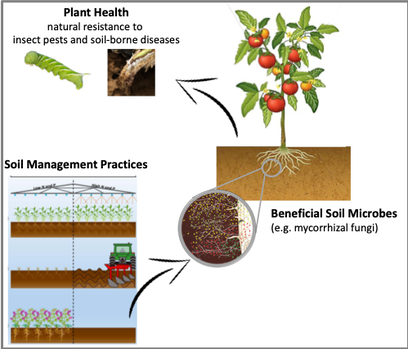Join our sustainable agriculture research on beneficial soil microbes!
Welcome! I’m Amanda – I’m part of a team of researchers at Davidson College and the University of Georgia investigating how beneficial soil microbes promote plant health, and what soil management practices cultivate those microbial communities. We are currently recruiting growers interested in collaborating with us by participating in our on-farm sampling network this summer and into the future!
In return for collaborating with us, we’ll provide you with a free, personalized report of nutrients and bacteria, fungi, and mycorrhizae in your soil. In addition, we’ll share our experimental findings with you, such as which management practices promote beneficial microbial communities. Below are details about the research and what’s involved – we would love to have you join us!
In return for collaborating with us, we’ll provide you with a free, personalized report of nutrients and bacteria, fungi, and mycorrhizae in your soil. In addition, we’ll share our experimental findings with you, such as which management practices promote beneficial microbial communities. Below are details about the research and what’s involved – we would love to have you join us!
|
The Project: Naturally-occurring microbes in soil, such as mycorrhizal fungi, increase plant nutrient uptake and enhance plant defenses, improving plant resistance to insect pests and diseases. Growers work tirelessly to build soil tilth and fertility, and in doing so encourage soil biodiversity. However, we lack an understanding of a) which combinations of soil fungi and bacteria provide the greatest resistance to insects and disease and b) which combination of soil management practices enhance these communities on working farms.
|
Ultimate Goal: To prescribe common soil management practices (i.e. fertility amendments, cover crops, tillage regimes) that naturally enhance plant resistance to herbivores and disease by cultivating communities of beneficial microbes.
What’s Involved: We would visit your farm (at a time convenient for you) one to two times this summer. We would collect soil within fields planted with tomatoes, and scout for insect pests and diseases within the field. In addition, we would ask you a couple questions about the legacy of the soil: previous crop rotations, types of fertility amendments, level of tillage, etc. Back at the lab, we would measure the nutrients in your soils and use DNA sequencing to determine the communities of bacteria, fungi, and mycorrhizal fungi present. In addition, we would use samples of your soils to determine which naturally-occurring microbial communities enhance the resistance of tomato plants to southern blight, caterpillars, and aphids through greenhouse experiments. All information about your farm will be kept confidential.
What you’ll get from us: We’ll provide you with a free, personalized report of nutrients and bacterial, fungal, and mycorrhizal communities in your soils. In addition, we’ll share our experimental findings with you (i.e. which management practices promote beneficial microbial communities).
Interested? Questions? We are so excited to work with you. Please email me at ammeier[at]davidson.edu
What’s Involved: We would visit your farm (at a time convenient for you) one to two times this summer. We would collect soil within fields planted with tomatoes, and scout for insect pests and diseases within the field. In addition, we would ask you a couple questions about the legacy of the soil: previous crop rotations, types of fertility amendments, level of tillage, etc. Back at the lab, we would measure the nutrients in your soils and use DNA sequencing to determine the communities of bacteria, fungi, and mycorrhizal fungi present. In addition, we would use samples of your soils to determine which naturally-occurring microbial communities enhance the resistance of tomato plants to southern blight, caterpillars, and aphids through greenhouse experiments. All information about your farm will be kept confidential.
What you’ll get from us: We’ll provide you with a free, personalized report of nutrients and bacterial, fungal, and mycorrhizal communities in your soils. In addition, we’ll share our experimental findings with you (i.e. which management practices promote beneficial microbial communities).
Interested? Questions? We are so excited to work with you. Please email me at ammeier[at]davidson.edu

